#123 Out of this world: George Skippon in BC, 1873-1875
A Great Old Tramp: Letters from a Canadian Sojourner in British Columbia, 1873-1875
by Greg Stott
First published April 22, 2017
*
Editor’s note, December 9, 2022: The SS Pacific, on which George Skippon met his death in November 1875, has been found! See this CTV news story and a CTV video here.
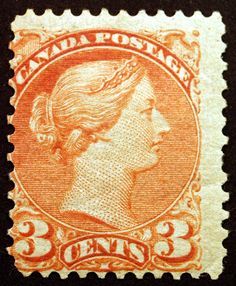
Editor’s foreword: Ontarian George Skippon — of whom there is no known photo — reached Victoria on April 26, 1873.
The itinerant Skippon stayed at hotels in Victoria, farmed in Saanich, toured the lower Mainland, worked on CPR exploratory surveys in the Chilcotin and Cariboo, worked on the E&N (Esquimalt & Nanaimo) Railway survey, considered mining for gold in the Cassiar, and spent a winter “batching” in a cabin near Victoria while working as a farm labourer. He wrote home frequently.
Written between his arrival in Victoria and October, 1875, the letters describe in vivid detail his life in BC before his untimely death. While on his way to New Zealand in November 1875, Skippon drowned, with up to 300 others, at Cape Flattery during the wreck of the American steamship Pacific.
The letters of this farmer-turned-adventurer were posted from many points of coastal and interior BC, mainly to his sister and brother-in-law at the family farm near London, Ontario. He frequently concluded his letters with a Chinook salutation. His sometimes ungrammatical but always highly descriptive letters provide an evocative, exploratory foray into BC in the 1870s.
 Editor Greg Stott of University College of the North in Thompson, Manitoba, has spent years bringing Skippon’s life and letters back into focus. Skippon offers tantalizing strands and glimpses of life and work in BC between 1873-75 and reveals the habits, attitudes, options, and opportunities of a vigorous and healthy working man in the 1870s. He opens a window into BC’s economy and settler society in this first confederation decade.
Editor Greg Stott of University College of the North in Thompson, Manitoba, has spent years bringing Skippon’s life and letters back into focus. Skippon offers tantalizing strands and glimpses of life and work in BC between 1873-75 and reveals the habits, attitudes, options, and opportunities of a vigorous and healthy working man in the 1870s. He opens a window into BC’s economy and settler society in this first confederation decade.
In 1982, historian Patricia Roy noted that we need “a thorough or systematic survey of British Columbia in the Confederation era” (Patricia Roy, “British Columbia,” in Granatstein and Stevens, A Reader’s Guide to Canadian History (Toronto: 1982). While Skippon’s letters do not provide such a survey, his letters and impressions are a suggestive start.
*
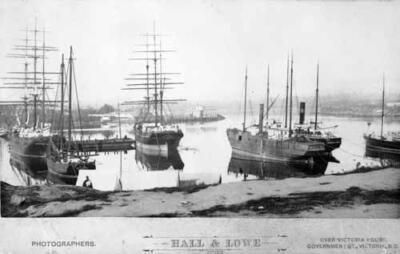
Skippon liked Victoria. It was the only city of substance in the province, a place of bustle and commerce balanced between a colonial past, a Canadian present, and oceangoing transport connections with the United States. He even considered investing his nest egg in real estate in Victoria. Skippon described the confusion caused by the different currencies in legal circulation on Vancouver Island: British, Canadian, and American, reflecting their influences and antecedents.
His farming experience in Ailsa Craig, Ontario, gave Skippon ample expertise to work for a winter on Robert and Ann Brown’s 600-acre farm in Saanich, near what is now Victoria International Airport. He described the work, crops, markets, climate, isolation, the Saanich Agricultural Fair, and the social life at the farm, including a detailed account of Christmas, 1873.
He even learned to cook – an admission that connects nicely with Adele Perry’s insight in On the Edge of Empire (Toronto: 2001) that a homosocial domestic culture developed in early settler BC in the absence of “white” women.
Skippon deals in lighthearted, oblique, or poignant ways with his loneliness, and marriage prospects. He was forty when he came to BC. He does not mention any romantic episodes of his earlier life at Ailsa Craig.
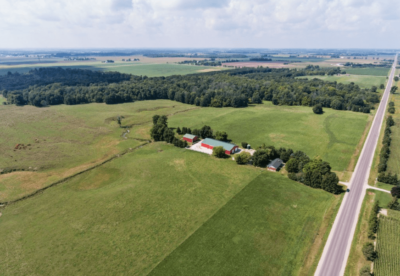
Exiled from the uniform agricultural richness of southern Ontario, he was baffled by the distinctive survey and farm system around Victoria, which was designed to give settlers access to the choice land in valley bottoms. “The farms are not laid out in square fields,” Skippon observed, “the shape of the field depend[s] on the shape of the patch of land between the rocks….” (letter of July 24, 1873).
He provided many examples of the use of Chinook, a language he seems to have mastered, including a Chinook translation of the Lord’s Prayer. He even advances a new conspiracy theory about the HBC. Chinook, he wrote, “is the language the indians use all over this country it is not their own language it was got up by the hudson bay company so that outsiders could not talk with the indians.”
Skippon preferred southern Vancouver Island to what he saw of the lower Mainland. While impressed by the agricultural potential of the Fraser Valley, he provides a scathing description of the lethargy and lack of colonial society in the logging and industrial communities on Burrard Inlet and in the former colonial capital at New Westminster.

Early in 1874, he considered going to the Cassiar gold rush. He gives a valuable description of the kit needed. Had he made it to the gold fields, his career might have resembled that of an 1860s Ontarian arrival, Tom Pattullo — whose nephew Duff Pattullo became B.C. premier — whose work in the Cariboo gold fields has been told by Don Bourdon in BC Studies (no. 185, Spring 2015).
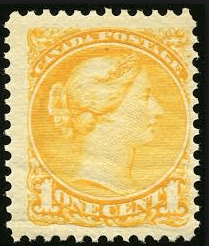
Instead, Skippon worked for CPR engineers Joseph Hunter and Henry Cambie on their exploratory railway surveys on Vancouver Island and on the Chilcotin and Cariboo plateaus. Skippon’s accounts provide a valuable supplement to the sparse writing on the CPR surveys and construction in BC, an endeavour that in many ways defined the province in the 1870s and 1880s.
On his return from what he called his “great old tramp” in November 1874, he penned a perceptive summary of his trip to the Interior, which was so different to the gentle rural landscapes of southern Vancouver Island and southern Ontario: “It’s like going out of this world.”
Skippon was surrounded, on coastal BC, by a deep, distinctive, and to him unfamiliar Indigenous fur trade, and by a recent colonial past. Like many newcomers from Ontario’s farming economy he noticed – and explored — the differences.
I apologize for this longer than usual introduction, but there is so much of interest in these letters and in the context provided by Greg Stott. I will now hand the floor over to Greg – Richard Mackie
*
A Great Old Tramp: Letters from a Canadian Sojourner in British Columbia, 1873-1875
by Greg Stott
By noon hour on April 4, 1873 George Skippon, a forty-one-year-old Ontario farmer, having crossed both the Mississippi and Missouri Rivers in one day, arrived in Omaha, Nebraska where he counted himself lucky to find dinner for a mere fifty cents after paying between seventy-five cents to a dollar at previous stops. As he had five hours to wait for his connecting train further west, he engaged locals in conversation and learned that they had survived a brutal winter which had seen a record number of fourteen days of sleighing. All of these things he confided in a “few hurried remarks” to his brother-in-law back in Middlesex County, Ontario.[1]
Carefully preserved by multiple generations of his family, Skippon’s letters home from British Columbia between 1873 and 1875 suggest the wonder, pathos, and inquisitiveness of a nineteenth-century man of moderate means whose documentary record would otherwise render a spare and unrevealing portrait. Indeed, if he had survived a shipwreck in November 1875, his letters might never have been preserved.
A native of Norfolk, England, Skippon was the son of retired soldier and veteran of Waterloo, Thomas Skippon (1783-1867) and his second wife, Phoebe Baker (1805-1875). As a young child he had emigrated with his parents, an older half brother, and an infant brother to Upper Canada. The Skippons initially settled at Markham before moving west to take up land in the southwest corner of MacGillivray Township, northwest of London, near the predominantly Scottish settlement of Ailsa Craig.[2]
Little is known of his early life. Presumably it was spent mainly on the family farm, which he inherited when he was thirty-five, upon his father’s death in 1867, and ran with his widowed mother. He was primarily remembered within his family as “an adventurer,” but whether he had shown such proclivities before 1873 is unknown.[3]
What motivated Skippon to leave is not recorded, but in a letter home of January 1875, he hinted at a sense of alienation in his rural home at Ailsa Craig, which consisted almost exclusively of nucleated farming families and where, he lamented, “I would be nothing but an old bachlor alone.”[4]
His words suggest some degree of regret and loss, and hint at the possibility that he had been unsuccessful in his romantic life. Whatever the “push factors” of his move to British Columbia, Skippon was one in a long line of restive individuals who, for whatever reason, found themselves at loose ends and who set out to find a new home, a new life, and perhaps adventure.
In British Columbia he would find a niche, a community, of like-minded footloose individuals who, he wrote in 1875, “never think about tomorrow nor the next day but have a good time of it as long as it last.”[5]
Although he confessed that he needed to get away and see a different part of the world, his letters show that he kept in regular contact with his relatives back in Ontario. The letters detail his travels, his employments, and his observations of the land and people he encountered. They provide valuable insights into what was then Canada’s newest province. He reported on the process of railway surveying and the relationships between the Euro-Canadian and Aboriginal populations. He also conveyed, often frankly, sometimes inelegantly, and always personally, the wishes, hopes, and indecisions of a nineteenth-century Canadian and his view of the world around him.
In 1873, British Columbia was the newest province in the infant dominion (Prince Edward Island joined Canada on July 1st of the same year), and seemed to hold out promises of prosperity and opportunity. Skippon must have been privy to the reports of boosters that proliferated in eastern Canadian newspapers and periodicals, indeed he mentions that Ontario papers had run articles on the new Pacific province.
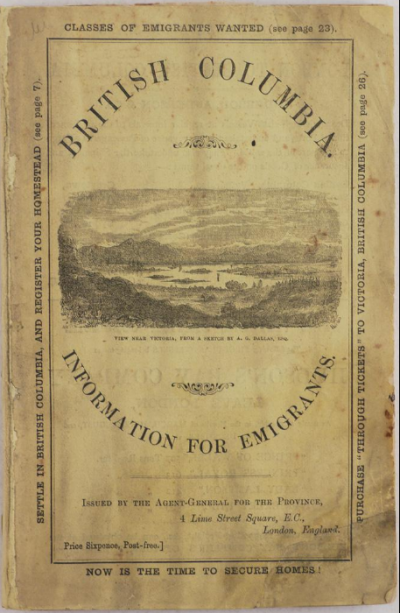
His decision to try his luck in B.C. came at the same time, for example, as the publication of Nova Scotian George Monro Grant’s Ocean to Ocean: Sandford Fleming’s Expedition Through Canada in 1872 (Toronto and London: 1873), which championed the transcontinental breadth and potential of the new and enlarged federation.
Skippon sought adventure and fulfillment within the localized and somewhat limited realities of a British Columbia grappling with economic uncertainty and coping with the disappointments offered by Confederation.
Before his departure he was careful to make provisions for his familial obligations and responsibilities. Aware of the hazards involved in his open-ended adventure, he drew up his last will and testament and bequeathed his home farm to his sister, Emily Donaldson, who lived there with her husband John.[6]
While his motivations can only be guessed at, his letters provide a first-hand record of one man’s odyssey to a land that, while sharing similar colonial institutions, surprised him by its stark physical, flora, and nuanced cultural differences. Like an immigrant to a strange if vaguely familiar land, Skippon’s letters provide insights into a liminal experience, into masculine and racialized identities, and into questions of responsibilities, familial duties, and into his restless quest for adventure and fulfillment.[7] He was also, without articulating it, caught up in imperial processes of immigration, settlement, and colonialism that sought to create a predominantly “white” and highly masculine society.[8]
*
We begin our narrative in the spring of 1873 when Skippon left Ailsa Craig with Victoria, British Columbia as his ultimate destination.[9]
After a comparatively slow journey from Nebraska to San Francisco,[10] he reported that he had had “a fine time on the cars” where he struck up a friendship with “four yankies and one english man.” But mainly he was a tourist entering a landscape that was new to him. He passed through hundreds of miles of sagebrush-covered desert and saw “some large droves of antelope some wolves rabbits and two buffaloes . . .”[11]
Although he had been awestruck as the train climbed the Rockies, he admitted that he found the Sierra Nevada Mountains to be “the prettiest sight.” He was impressed by the grandeur of this coastal range and cheered by the familiar presence of orchards and cultivated fields of wheat.[12]
Sacramento was “the prettiest place I ever saw,” but “it is not healthy,” and while San Francisco impressed him for its size and bustle of business and shipping, he complained that “it is not a pretty place [and] some of the streets are so narrow there is not more than room for two teames to pass…. ” He splurged and spent five cents on a streetcar that took him to the famous Woodward’s Gardens were he saw its orange trees, an exotic variety of plants, and “wild beasts and birds of all kinds.”[13]
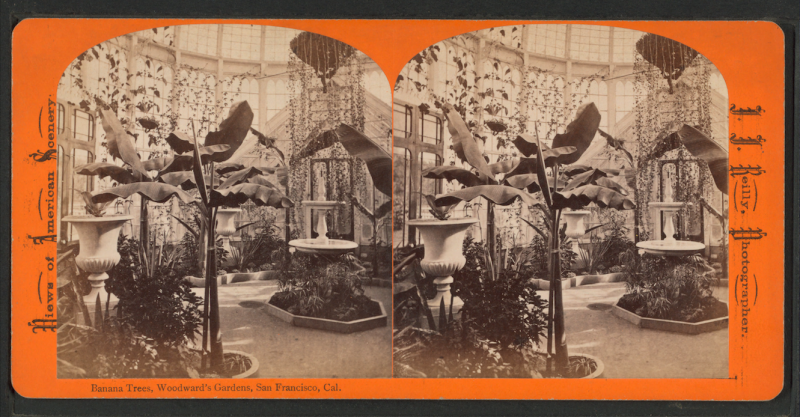
With a week under his belt in San Francisco he had booked passage to Victoria aboard the British vessel Prince Alfred, a journey he described — presciently as it turned out — as tempestuous and hazardous. “We had a rough time of it the first two days,” Skippon wrote. “We had strong head winds the sea was very rough the ship rolled and pitched at a great rate. [W]e had eight passengers on board most of them were sick and we had a greatest spewing time I ever saw but I never got sick at all and that was more than I expected.”[14]
Skippon would not be so fortunate on his return voyage two and a half years later.
He reached Victoria on 26 April 1873. While his initial observations and assessments of the capital city were positive, inevitably they mirrored the prevailing attitudes of those involved in the project of “White British” colonialism. Victoria, he wrote.
is a pretty place with between three and four thousand inhabitants the people here are all look healthy and well [and] there is plenty of indians here and squaws to [too,] all quite styleish some of them quite knobs a good many of the squaws go dressed in black silk[.] I have pretty near fell in love with some of them[.] I can’t tell you much about the place yet [although] the grass is all green the fruit trees are all in blossom [and] pears apples plums and cherries are plentiful….[15]
His attitudes, while not overtly dismissive, certainly suggest both surprise and an implicit indication that he would not pursue their affections.[16]
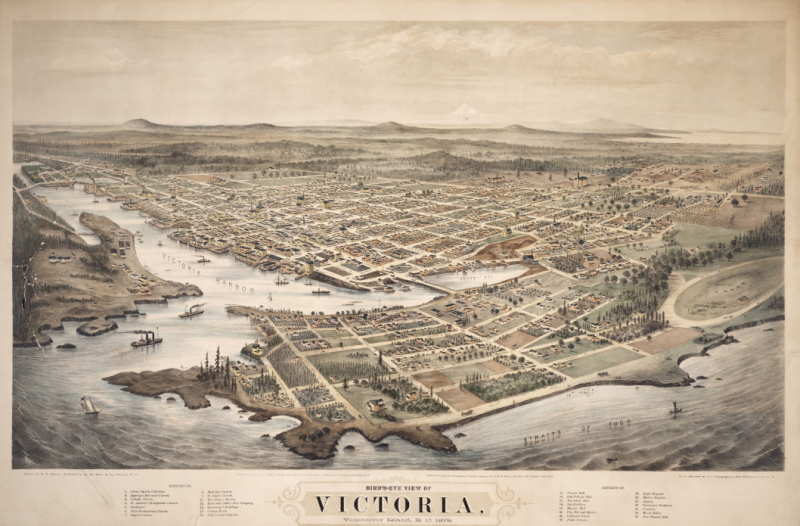
Notably, even two years after British Columbia joined Canada, Skippon readily fell into the local habit of referring to people from Ontario as “Canadians,” a holdover from the colonial era when Canada was some 2,000 miles away. Two days after arrival, he wrote, “I have plenty of company [as] there is five Canadians staying at the same place with me.”[17]
He also visited some farms in the valleys surrounding Victoria — possibly in Saanich — and found the situation of farms “strainge” after the greater regularity and more consistent fertility of the southern Ontario landscape.[18]
For all his pleasant reporting of life on southern Vancouver Island, he decided to take a steamer to the mainland to see what was on offer at New Westminster. Disappointed, he was back in Victoria by the middle of May.
Of New Westminster he wrote, contemptuously, that “it is a mean little good for nothing place [and while] the news papers call it a city I call it a small village not as good as Ailsa Craig[.] there is a few good buildings in it but the most of its is made up with indian shanties.”[19]
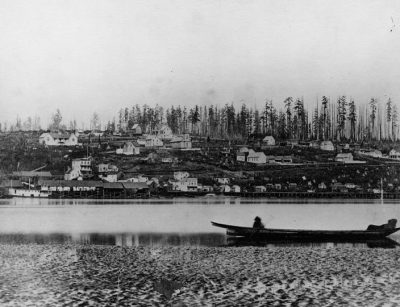
Burrard Inlet dismayed him even more. It consisted of “another city still worse if could be.” He found two established saw mills at Moodyville and Hastings and a community populated by a few men of European descent, with the bulk of the population consisting of local First Nations.[20]
He was more impressed by the forests and farmland than the nascent towns. He marvelled at the size of the surrounding forests and the gigantic trees which, when sawn up, could fetch between “nine and twelve dollars per thousand at the mill.” Potential farmland on the lower mainland was valued at $150 an acre, but the density of the timber made it “not worth a curse.”[21]
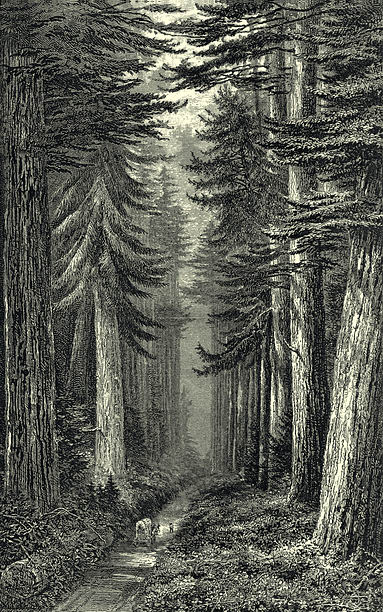
Better but more remote land might be found further up the river valleys, while land more readily available for cultivation at the mouth of the Fraser was prone to winter flooding. He told his family that the climate was good and “the air pure and pleasant,” but regarding what Ontario newspapers reported on British Columbia, “you can mark them down for about half lies.”[22]
Whatever his misgivings about the mainland he had clearly fallen in love with Victoria. While he found prices dearer than in Ontario, he waxed poetically of the city’s charms:
the air is pure and pleasant such as Ontario never saw[.] this is a great place for flowers and berries[.] Victoria is the prettiest place I ever saw[.] I can stand in the street and see the Pacific ocion [sic] and the snow mountains in Washington Teritory on one side and mountain covered with timber on the other side….[23]
As for his fiscal hopes and realities, Skippon remained cagey. “I have worked some,” he admitted, but “I don’t think I shall work much for awhile.” If, he continued, “my calculations work out there is a small speck to be made but I am not quite man enough for it.” He asked his relations to forward him $100, adding that, “I shall not tel you what is [for] just now til I see how I come out.”[24]
However, when the money arrived too late (on 27 June) for his proposed investment, he revealed that his plan had been to speculate on building lots on the outskirts of Victoria. “I don’t need the money now so I just slamed it into the bank for another chance.” And he added candidly:
I have got a good job the work is light and the pay is light to[.] I get twelve dollars per week this you may think is pretty good but I pay six dollars per week for my board [at the Charles Morton Hotel] and its very easy to spend some besides so I don’t save big things but I can save a little and have a good time[.] I have the best times now I ever had in my life[.] I am just as happy as a bumble bee on a big sun flower but I don’t know how it will last [as] times have been dull here but I think they will get better soon….

He added that a recent call for twenty railway workers had netted 170 respondents, a clear indication that “men are not scarse here.” He added that he might apply for work as a “chopper” with the railway for $45 a month plus board, “if I wanted to work hard,” but, he explained, “I don’t care much about money[.] I want a good time.”[25]
He also complained about the confusing proliferation of various currencies (British, Canadian, and American) mostly in coin, and a complex system of exchange that took some time to master.
“It cost a bit [25 cents] to get a shirt washed and the same for pair of socks,” he told his sister, while “a ten cent plug of tobacco is tow [sic] bits here”[26]
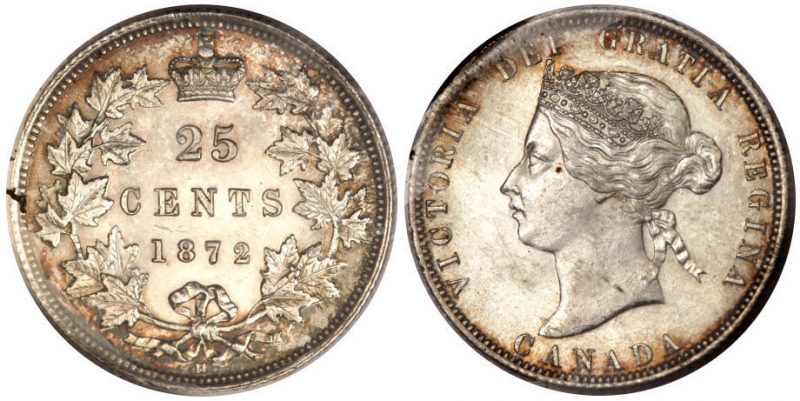
Living the “life of Riley” left Skippon time to make observations about his new surroundings on southern Vancouver Island. He commented on the general dearth of flies and on a snake, he told his sister, “as thick as your mat hook.” Mostly he relished his free time, explaining:
I quit work at six and it is daylight til nine so I have time to write a letter mend garments or do as I like[.] I am now sitting in my room [where] I can look out the window and se the ocean that is mor than you can do[.] we have had picnicks celebrations and horse races people seem to enjoy themselves here about as well as in any other place[.] they have a splendid race corse right on the sea shore with a large hill in the centre called beacon hill[.] from the top of it you can see as far as you like to look.[27]
Naturally, as a single man in his prime he was quite conscious of his unmarried state. On Sunday evenings, he reported, “the youth and beauty of the place [go] walking round in twos [with] one holding up the other ones arm[.] I don’t know what thats for but it seems to be pleasant to them both for they look at each other with a kind of heavenly smile.”[28]
Many scholars have remarked on the strong gender imbalance in early settler British Columbia.[29] European men outnumbered white women, and many lived without their company. Anxious to disabuse his relations about a general dearth of women in Victoria, he noted frankly that that “there is plenty and fine ones too[.] I am just beginning to get acquainted with them[.] I nodded my head the other day but she kept on her way and never let on she seen me[.] I don’t care very much but I won’t speak first again.”[30]
Victoria did have a large number of women of Indigenous background. While many of these women were exploited for sexual gratification, some women formed stable partnerships with white men who made Victoria home. If Skippon formed any such relationship, however, his letters do not say.[31]
While Skippon worked ten hours a day he maintained that this left plenty of time for exploration and recording his observations in his letters home. In mid July 1873, he explained that:
I took a tramp into the country . . . to see the crops and the farmers as they call themselves[.] you have very little idea the way farms look here[.] there are some good gravel roads here just as good as you have got but they don’t run straight [because] they run around rocks and mountains and as rough as the country is[,] the roads are pretty level [.] the farms are not laid out in square fields the shape of the field depend on the shape of the patch of land between the rocks in some places there is 5 or 6 acres to have land enough for a farm you want from 500 to 1000 acres[.] the crops as a rule [are] good this year the hay is mostly all in now the barley and peas are nearly ripe and so is the fall wheat[.] I tryed to get a job at harvest but they would only give $1 per day and they want a man to work 16 hours and then milk the cows after that and sleep on the floor at night [.] a man here have to pack his blankets wherever he go so I came back to Victoria again….[32]
Skippon alludes here to the stark contrast between the farming districts of southern Ontario and southern Vancouver Island. His home at Ailsa Craig in MacGillivray Township, north of London, had been surveyed and laid out on a grid system based on the cardinal points of the compass. Southern Vancouver Island never enjoyed such cartographic regularity. The colonial surveyors had laid out farms in between rocks and swamps, and their roads also followed the level and lower land.[33] Modern visitors to southern Vancouver Island are still struck by the meandering and maze-like arrangement of the road system.
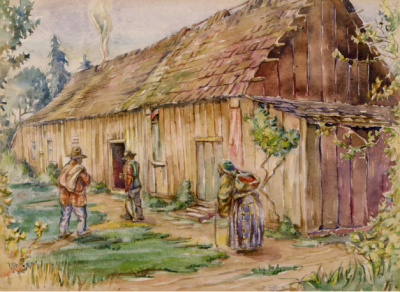
Four days after his farming epistle, on 28 July, Skippon hastily penned a letter to say that he was leaving Victoria at 3 p.m. that very day on the Prince Alfred for San Francisco. “I feel a little sorry to leave Victoria [as] it is [the] nicest place I have seen but times are to dul for me.”[34]
But before he could board the ship, an unexpected agricultural opportunity intervened. He wrote again later the same day to say that shortly after posting his earlier letter, good fortune intervened: “I was just going to get my ticket when I met a farmer who wanted a man and we struck a bargain.”[35]
The farmer, Robert Brown, like Skippon was a “Canadian,” though he had immigrated to Upper Canada first from his native Yorkshire, and then to Vancouver Island. Brown and Ann, his wife, lived in North Saanich on a large farm on McTavish Road south of what is now Sidney, B.C. Brown was harvesting 100 acres of wheat with a reaper. Brown suggested paying $25 a month for a year, although Skippon noted that “we have not agreed for any length of time.”[36]
The situation at the Brown ranch of 600 acres seems to have suited Skippon quite well and, falling back on his extensive farming background, he quickly settled into its rhythms. Of his employer Skippon wrote, “I think he is a fine old chap to get along with.” Skippon further explained that there were approximately 170 acres of land devoted to wheat and barley that they were in the process of harvesting in August.
Describing a typical day at the Browns’ establishment, Skippon wrote “we get up at six in the morning have breakfast and get to work by seven[.] at ten the old lady come to us with cakes or pies and some times both and a big tin can full of beer[.] dinner at noon to work at one beer and cakes four supper at six and then do as we like . . .”
Conscious that he had a good situation, Skippon was also aware that his wages were low, which “is all I have against this place.” Adjacent to the sea, the farm afforded “some fine swims,” and in the fall whales were visible from the Browns’ house.
In his letters home, Skippon continually evaluated how long he would remain in Saanich. He felt he might stay for three months noting, with some hubris and a good agricultural metaphor, that “I have a good many wild oats to sow yet and I don’t think there is room in British Columbia for them all.”[37]
The Browns asked Skippon to stay on over the winter. With few other options, he suggested that he was likely to accept the offer.
At the Brown Ranch, Skippon worked with a twenty-year-old he described as “jovial” fellow who played the fiddle, and a sixteen-year-old of mixed European and Indigenous descent who “can talk good English and we have fine fun with him.”[38]
Indeed, his reaction to the Island’s Indigenous people reveals much about general colonial attitudes. Skippon reiterated that Native women of Victoria, with their silk dresses, “are a little to styleish for me,” but he had far from complimentary remarks on the people he met at Saanich. Playing the part of amateur anthropologist he wrote of the people who lived in the vicinity of the Brown farm. His remarks were ethnocentric and disparaging. He condemned them as “a poor cowardly lot,” deemed them “lazy and mean,” and contended that “the best way to get along with them is to use them rough.” He also believed that “if you give them any thing they will bother you all the time.”[39]
Having (apparently) observed their marriage customs, he found them deplorable: he asserted that women were essentially bought and sold as commodities. A women’s father would be approached by a potential suitor to “buy her [,] the price depends on the mans property,” with a man of lesser means securing a bride “for two bits.” However, wealthy suitors might “have to pay a big price sometimes ten pair of blankets or two or three cows or perhaps a canoo worth from fifty to one hundred dollars but in all cases they must pay something to make the marrage legal.”[40]
The degree to which Skippon had interactions with Indigenous people in Ontario is unknown, but he felt qualified to judge the peoples of the West Coast to be “not so smart,” due to the fact that “they live mostly by hunting and fishing.” That many now found work on local farms at harvest time he saw as a positive development.[41]
At some juncture – perhaps in his general interactions or in his specific connection with the jovial mixed-blood teenager who worked with him on the Brown Ranch — Skippon picked up a competence in the Chinook Jargon, a lingua franca of trade and contact that had emerged up to a century earlier along coastal regions and in the Columbia River basin, borrowing heavily from local Indigenous languages and adding elements of English and French.[42]
In an undated note Skippon explained:
[T]his is the language the indians use all over this country it is not their own language it was got up by the hudson bay company [sic] so that outsiders could not talk with the indians the indians soon learnt it and they can talk it as fast as they can speak their own tongue differ in almost every tribe but they can all talk Chinook I can tell most all they say but I talk very slow I have to stop and consider….

On the same undated scrap of paper Skippon, who was Anglican, included “the Lords prayer in Chinook:”
Nesika papa klaksta mitlite kopa
saghalie. kloshe kopa nesika
tumtum mika nem kloshe
mika tyee kopa konawy
tilikum kloshe mika tumtum
kopa illahie kahkwa kopa
saghalie potlatch konaway sun
nesika muckamuck. spose
nesika mamook masahchie
wake mika hyas solliks pe
spose klaksta masahchie
kopa nesika wake nesika
solleks kopa laska mahsh
siah kopa nesika konaway
masahchie.
Klosh kahkwa.[43]
Skippon’s work on Brown’s farm increased so that, in late September 1873, he attributed his relative dearth of correspondence to the fact that “I have been busy in the day time and I have been dancing at night.” Brown and another farmer had apparently pooled their resources and acquired “a new thrashing machine from Canada,” and Skippon had been working full out for more than a week at the harvest.
Despite the busy harvest, he noted that “we dance half the night” to two fiddlers and “one fluter” supplied from the local community. The dancers’ enthusiasm eclipsed their skills, Skippon guessed, due to a lack of practice. When Brown asked Skippon to stay on for a full year, he hesitated because, he confided, “the worst of this place is the old chap has no daughters.”[44]
This is an unequivocal statement of his desire to get married and assume a sedentary life in his new home. His situation with at the Brown ranch might have recreated his bachelor circumstances back at the Skippon farm in Ontario.
A month later Skippon boasted to having procured “a grand new pipe” along with a pound of pipe tobacco and a copy of the Toronto-based Globe. Typically he had made no firm plans for his future. However, he explained, “I have not caught any whales yet [and] we don’t expect them up till next month.”
He remained busy with the wheat harvest, the results of which he considered “the best I ever saw,” but his attempts to peddle it in Victoria netted very little and he lamented that storekeepers ultimately used it for feeding chickens. As there was no gristmill on the island, “flower [sic] it comes from California,” and in general “farming here is rather a poor business.” He had attended the Saanich fall fair but believed “it was a poor afare,” for while the displays of local fruit, grain, and root vegetables were respectable, the livestock he judged to be “poor.”[45]
All and all, however, he judged his first months on the coast favourably. He concluded:
It has been the pleasantest and happiest summer I ever put in [though] it’s a pity such a climate should be wasted on piles of rocks & mountains but there is some good land more than I thought at first but the best land is mostly owned by knobs who won’t sell it for its value [and] they ask 100$ per acre for land near Victoria.[46]
Skippon also recorded his response to the Pacific Scandal that so rocked the political establishment in Ottawa and saw the toppling of Sir John A. Macdonald’s government. The news was met with considerable dismay in British Columbia where, Skippon reported, “people here are down on the lip.” “[T]hey are nearly all conservatives and they think the grits won’t build the rail road.” Some even believed that British Columbia had “better leave Canada and go their own hook.”[47] And month later he commented that, “if they would start the railroad times would be pretty lively.”[48]
On Christmas Eve, 1873, Skippon acknowledged the receipt of a letter from his sister and brother-in-law dated 26 November, and took the opportunity, like many more recent arrivals from east of the Rockies, to tease friends about the weather back home:
I see you are putting in a pleasant time of it with your frost and snow just like Ont. [it is] a pretty place to live in[.] I suppose you are going around now blowing your fingers and muffled up with two or three over coats on and here are we going about in our shirt sleaves with no mittens on and plenty warm & enough at that. We had a snow storm on the 27th of Nov. Snow fell about four or five inches deep. That noted personage the oldest inhabitant says it was the greatest storm he ever knew at that season of the year. I riged Mr. Brown a sleigh and we had some sleigh rideing but it was soon over the snow is all gon now and it is nice and warm….[49]
While Skippon commented on the drawbacks brought on by the winter rains, he admitted “I must quit telling you about the climate or you will get the Vancover [sic] Island fever and be comeing out here and then you might be sorry….” While the weather was generally mild, Skippon cautioned “times are very dull as far as I can see [and] a man can make more money in Ont. bad as it is then [than] he can here.”[50]
He also revealed that Brown wanted him to purchase shares in his farm and go into business with him, but given the “rough state” of the farm, and having worked for four months, Skippon was hesitant to tie himself down as “I am living [like a] gent again.” Brown acknowledged his reluctance and insisted that he stay on at least until spring owing to the general dearth of employment He wanted him to stay for a year but Skippon hinted that he would not be paid: instead, Brown would provide him with room and board if he would “make him some gates and tinker things up for him.” Skippon had also flirted with the idea of acquiring his own farm, but he complained that that a nearby “old cub” wanted the exorbitant sum of $1000 for 100 acres of “wild land.”[51]
Skippon had other arguments against farming. News of new gold strikes in the Cassiar District in northern B.C. had caused excitement and many locals were determined to head to the new fields in spring. Skippon, however, confessed that while he was considering the possibility of heading north, it would not be in pursuit of mineral wealth. “I have not got the gold fever yet,” he declared, and cited the stories he had heard about the harshness of the northern climate, with snow starting in September. He also learned that prospectors “have to carry their grub on their backs 80 miles that don’t suit me.”[52]
The Christmas holidays afforded Skippon great pleasure and he explained to his sister and brother-in-law on 10 January 1874 that:
I have had a big time of it since [my last letter] so I think I may as well tell you of it [as] I am in good health and enjoying myself firstrate[.] I am living quite the gentleman now we had a party at our house on christmas day and had a good time of it[.] I sent a full discription of it to Humble [husband of Skippon’s sister, Susannah] so its likely you heard of it. Well we were all invited to a party on newyear about five miles from here so we went and a jolly old time we had. There was no dancing but there was most every thing else the only falt I could find with it there was not one young girl there but there was plenty of old bachelors like myself so I got along very well.
Here Skippon returns to an increasing theme of his letters – an interest in available marriage partners. And he continued:
We got there just before noon and we staid till after dinner next day[.] we never went to bed nor got one wink of sleep all night. I tell you we had a rare blow of turkeys geese and grouse roast beef and mutton plum puding minces pies and other pies and cakes to numerous to mention [with] every thin was done up in firstclass stile. I have read about tables groning under the weight of good things upon them but if a table ever had cause to groan Mrs. Bryants had. We had five meals over twenty of us and there was all of twelve baskets full left. Then we had brandy wine rum whiskey gin ales and porter the very best could be got besides a box of havanna cigars. Singing songs playing checkers playing cards spining yarns eating and drinking were among the principal amusements and with one or the other there was no time lost.[53]
While Skippon admired and celebrated this bacchanal and gourmand holiday festival, he also juxtaposed it with an account of “how our neighbours the indians are passing theirs.”[54]
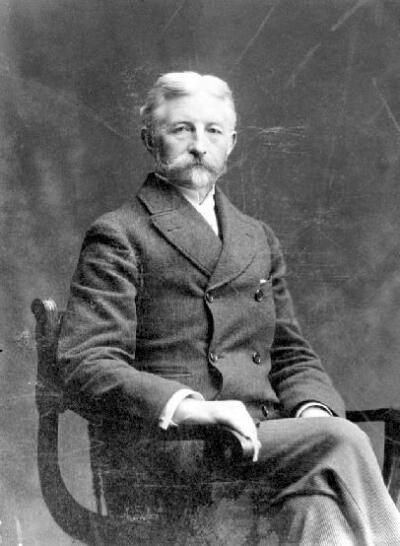
With some disapprobation he described what he termed the “cultus potlatch.” Like many Euro-Canadian observers Skippon’s attitude was one of bafflement and condescension. It is unclear whether he witnessed a potlatch or merely repeated what he had been told. A “cultus potlatch,” he related, involved the coming together of a community “when a man get rich.” He described how a man would adorn himself with paint to “look as wild as can make himself,” and then with a rope tied around his waist he would rush outside and into the water before the house. He would then ritually kill a dog and consume some of its flesh and then “jump and yel wilder than ever” until, “exausted,” the other men pulled him back into the house where a feast was held.
Afterwards, he continued, “they commence to dance” with music provided by musicians who beat upon a board. After considerable merriment the host began to distribute “preasants,” and he “don’t stop till he give away every mortal thing he have got.” Should he have only one blanket, he would cut the blanket in two and distribute the pieces accordingly to his guests. Once the gift giving has been completed, “when his friends go away they leave him beggared and it is a long time before he is as well off again.”[55]
While Skippon had become adapted to the relatively warm climate – he even reported on “little bats … flying around here just like summer” — he had to report a major snowfall that started on 17 January. The snow fell to the depth of approximately sixty centimetres in what locals asserted was “the greatest snow storm” since 1862.
His relationship with Robert Brown had deepened to one of almost filial devotion, for in the wake of the storm Skippon noted that he had “made dad a cutter and him and I went to Victoria [though] the snow in town was only about three inches deep….” The city’s streets, he noted, sported “sleighs and cutters all sises and shapes some made runners of two boards and put an old dry goods box on it.” Despite the improvised winter conveyances, no one was “ashamed of their rigs.”[56]
The realities of west coast winter rain soon weighed upon Skippon’s spirits. In late February 1874, he explained his lack of letters: “I have nothing worth telling you, since … the weather has been most miserably unpleasant,” and while there had been little snow since the storm, “it rained almost every day it just rained and rained and rained and then it rained again.” The predominance of wet weather meant Skippon “could neither hunt nor do any thing else so I holed up and smoked my pipe.”[57]
Once, during a break in the weather, Brown hired him to build a log house. Having hewn most of the logs, in February he was waiting for favourable conditions for the actual house raising.[58]
In the meantime, in this dismal west coast monsoon, Skippon had an encounter with an Indigenous neighbour:
I learnt a little more about them one morning when he came [and] he told us his kloochman was sick (his wife he meant) and he said I think she will die but I don’t care much [as] I know where I can get another for nothing[.] he say when indians die their spirits turn into little owls and that is them we see flying about[.] he say this world is flat and it is joined to the sky a long way off so far that man would die of old age before he could get there. I asked him where did the old moon got to when the new one came [and] he said he did not know but he expected it went up into heaven. the indians here are quiet enough but in the uper country they are very unsettled [and] the settlers are afraid of them [as] they don’t know what day they well start in a war path and if they do break out there will be tough times.[59]
He signed off his letter with “nika kopet klahowya Sikhs.”[60]
Whether from his interaction with this unnamed neighbour, or from someone else, it is clear that by this time Skippon was adept in the use of the Chinook Jargon, and he frequently concluded his letters with a Chinook salutation.
Letters from Ontario were often rare to the point where Skippon was unsure if his own letters were always getting through. Earlier (November 23, 1873) Skippon had complained about those family and friends from whom he had not heard.
By the end of March 1874, the log house he had been building was nearing completion save for half the roof. Tired of the climate, he reported that while he might remain in Saanich until autumn, “I don’t want any more Vancouvers winters.” Instead, he was seriously considering heading north to the Cassiar mines even though he noted the winters and climate were considerably harsher than those of southern Vancouver Island. He signed off with “Klahowya.”[61]
On 1 April 1874 Skippon was in Victoria, having scored a job as a carpenter for five days. While pleased with this work, vague promises of future work were not enough to live on, and “so I went back to dad” to help with the planting. However, as he explained to his sister and brother-in-law, “I think in all probibility before this reach you I shal be in the frozen regions of the far north with my pick and shovel diging gold up to the eyes.” And he continued:
[A]s far as I can learn it is about 900 or 1000 miles from Victoria [and] we take steam boat Otter to fort Wrangle in Alaska fare $25 time from five to six days then take a small steam boat up the Stickeen river to bucks bar in B.C. I don’t know the fare nor the distance but it is about 150 miles and then come the fun [as] it is from 80 to 100 miles to the mines and it have got to be tramped the walk is nothing but to carry the outfit is the trick. Every man take his blankets a pair of gum boots a frying pan a small pot plate and coffee pot a sack of flour a hunk of pork beans sugar coffee and tobacco of corn. Then there is pick shovel axe washing pan and tent every man have his tent . . . we miners are a hard lot you bet. Go to Victoria now and you hear nothing but gold mines its all excitement [and] there is five or six hundred gone now every boat is crowded and hundreds more are going . . . all sorts of wild tales are afloat here [that] men are making from ten to thirty dollars per day now and the snow is 4 feet deep and the ground frose so hard they have to make fires to thaw it out before they can work it . . . but it don’t do to believe half what you hear in this country.[62]
Skippon was wise to weigh the rumours critically. Almost a month later he wrote from Victoria:
I suppose you thought I was in Cassiar by this time diging gold up to the eyes well I thought at one time I would be but then I ain’t. the fact of the matter is it is generally supposed now there is very little gold in Cassiar to dig. I left Saanich with a full intention of going right strait but when I got to Victoria I thought I would wait a little while and see. and I did see. I seed a whole boat load of miners come back and not one of them had any gold. the latest is that there is hundreds left the mines and on their way back so I then think I won’t go. The fact of it is it was just a wild cat excitement got up for speculation they get up one every two or three years [and] that is the only thing that keep this country alive….
Congratulating his sister on the birth of a son, he went on to mention that he had overcome a recent illness and was seriously considering leaving Victoria once and for all aboard the Prince Alfred to try his luck back in San Francisco, though he admitted that, as always, he was not certain of this plan. He signed off “Nika Copet Klahowya.”[63]

In June 1874, from his new digs at the Angel Hotel in Victoria, Skippon mused: “well I may die a natural death or I may get killed but there is one thing curten I never will hang myself because I don’t keep long enough in one mind.”
As had happened before, his determination to quit British Columbia had quailed, having found a job he thought would last for the summer. He was also heartened by rumours that “there is some stir on the main land” that surveying work and new road construction would employ as many as one thousand men.
A lack of detailed and reliable basic information about B.C.’s topography was a major problem for both the CPR and the Geological Survey of Canada, which was working its way through the province’s interior under the direction of the indefatigable Dr. George Mercer Dawson. While this general lack of topographical information may have bedeviled Skippon and those for whom he worked, he was concerned that his sister’s impression of his life and surroundings were unduly negative. He replied:
[I]t is strainge what ideas folks form of distant places. that dreadful wilderness. well it is a wilderness no doubt, but I fail to see any thing dreadful about it. and as for rough companions some may be a little that way in their way but as a rule miners are true hearted men that will stand by a chum till the last and will share the last bit. of course a man will die in the mines sometimes. well if he do his chums will bury him and thats all there is about it. now if a man die at home his friends have to bury him so you see it all comes to the same thin. and the saveges you speak of are not of much account if ten or a dozen got a man alone and felt disposed to go for him well they might hurt him. but where there is a few white men together there is not the least danger. but you can rest on that score now for I have gave up the notion of going. one of my chums went and came back and he tell me it is no use going unless they find fresh digings.
At loose ends, Skippon was vague about his prospects in June 1874 and suggested possible moves, but he was noncommital to anything.[64]
By early July, however, things had changed. Skippon found himself involved in the critical post-confederation enterprise of working for the nascent Canadian Pacific Railway, the great promise made by the Dominion of Canada to persuade British Columbia to enter the union. The lack of progress had vexed many. No consensus had been reached on a final route and various players advocated very different plans. Victoria’s own Alfred Waddington proposed a line from the Chilcotin Plateau through the Homathko River to Bute Inlet, from where it would then jump from island to island and down the east coast of Vancouver Island to Victoria.[65]
With this uncertainty in mind, in a short epistle home Skippon explained that:
I am in good health and I have just engaged to go with a survey party to go on the main land. I go with Mr. [Joseph] Hunters party to survey the great Canadian Pacific railway. as far as I can make out we commence operations about four or five Hundred miles from here but I don’t just know where it is or how far. nor I don’t care. my expences will be paid there and back and I get $45 dollars per month and board[.] it will be a great old tramp you bet. I must cut my letter short . . . [as] our boat leave at 8 o’clock tomorrow morning and I have a lot of little fixings to attend to.[66]
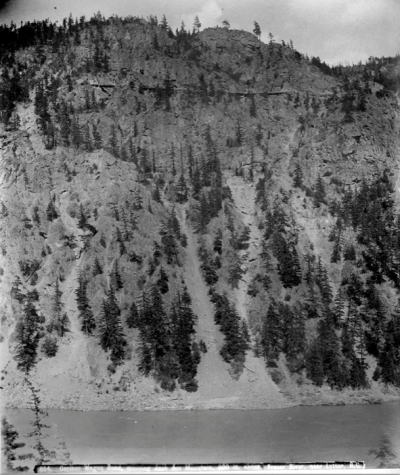
It would be two months before his family in Ontario heard from Skippon again. By this time, he was on the shores of Mahood Lake in the Cariboo Mountains, east of Canim Lake and the Fraser River. The party had reached the lake after a two week trek from the Chilcotin Plateau. Their job was to survey a thirty-eight mile stretch of the proposed railway before moving “about sixty miles to a place called Kamloops,” where it was expected they would be until December.
From Mahood Lake, he explained that his boss was sending out mail, and that he would not be able to catch up on word from home until he returned to claim his mail in Victoria, where he expected to be by the start of winter. In November 1874, he described the trek or tramp he had taken:
we left Victoria by steamer for New Wesminster [sic] next day left the royal City on the river boat to Yale the head of navigation on the Fraser and took stage nearly 200 miles there is a waggon road all the way from Yale to Cariboo and such a road as you never drove over in lots of places it is made on the side of rock bluffs where they had to let men down in ropes to do the blasting[.] the road is from 12 to 18 feet wide and no railing on it it would be a poor place to break colts if they run off they might go down 3 or 400 hundred feet and in some places far more without a rest….[67]
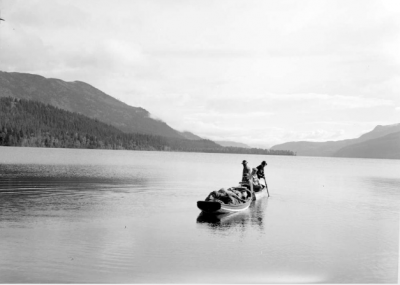
Of Mahood Lake itself, he explained that:
this is a wild rough part of the country we have the whole place to ourselves there are no indians here only one small tribe of about six or eight familys and they are very shy [and] we seldom see any of them but here is any amount of game bears deer mountain sheep and a few wolves but the greatest thing is the foolhen they are the sise of a small hen and they will sit stil and look at us til we go up to them and knock them over with a stick[.] they are a might good to eat and we get splendid fish in all the lakes and creeks but we don’t depend on what we can catch [as] we carry plenty of grub with us [and] we have had fresh beef all the time so you see we ain’t bad off[.] this is the best old tramp I ever had the worst of it is it won’t last long enough. I think when we get bak to Victoria I shall leave the country and give it a name and try some other part of the world….[68]
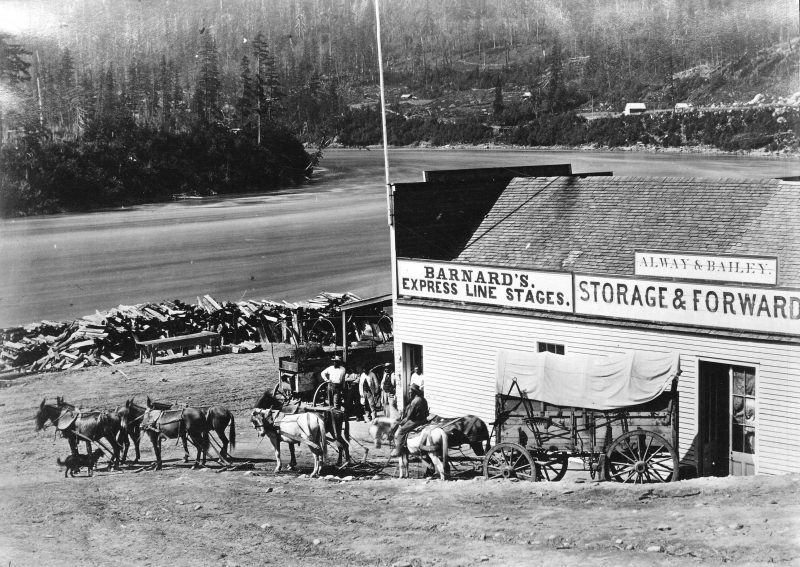
Skippon returned to Victoria on the steamer Enterprise on 18 November 1874. The letters awaiting him were locked in a safe, and he had to wait a week before the landlord returned to receive them. The Ontario news included tidings of the death of one of his good friends. He explained that his own health was good and that he now weighed in at 171 pounds, which was a full eleven pounds more than he had ever weighed in Ontario.
Notwithstanding his earlier letter of life at Mahood Lake, he noted “we were there about a month shut out from the world no human being not as much as an indian within 100 miles of us . . .” Game, he reported, was plentiful: bears survived on the weasels, the weasels in turn lived off the mice, but “how the mice live none of our party can tel.”
While at Mahood Lake, the CPR party had to build rafts to ferry their livestock and teams to areas for grazing before leaving “that pretty place Octr. 10th,” and travelling along the Thompson River to Kamloops.
At Kamloops they boarded a steamer “about the sizse of 5 or 6 waggon boxes,” and then transferred to a series of stages to Yale, where the party laboured “til rain and snow drove us out.”
After a “great old tramp” of close to 1,000 miles, extending over four months and thirteen days, the pay had amounted to $199.40.
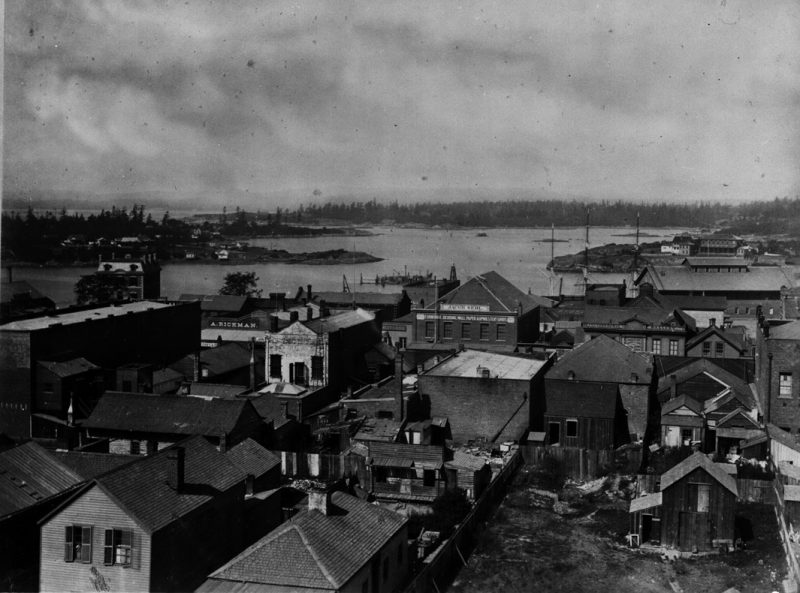
Regarding the Interior of British Columbia, he concluded “this is a strange place I can hardly reckon it up[.] Kamloops and Okenagan as far as I can judge is the best part of it[.] they can raise most any thing and stock live out all winter but its like going out of the world.”[69]
By December 1874, Skippon had resolved to remain a while longer in Victoria even though he decried that “Times are very dull here just now.” His hope of leaving had been thwarted, he claimed, when his friends “here don’t want me to leave and I don’t see as how they can get along very well without me so you see rather then hurt their feelings I have concluded to stay awhile longer.”
He had given up his lodging at the Angel Hotel and with another man rented a two-room cabin where “we can live first rate” for three dollars a month — a considerable savings from the six dollars he had been paying at the hotel. Unable to find steady work, he reasoned that “I don’t want to get wet every day,” so it suited him.
When a good friend wanted Skippon to join him in California, he made his decision to stay in Victoria by means of a coin toss. He was contented to remain for a while, as he explained in late December 1874:
I saw Daddy Brown the other day [and] he wanted me to go and work for him this winter but I can’t see the point. not that I have anything against him but they have a little to much rain and snow out there to suit I. he say last winter was worse than he ever saw it before but I don’t know about that. a chum of mine have been in the country twelve years and he say he never seen it any other way.[70]
Skippon spent much of the winter of 1874-75 in rather relaxed and even indolent circumstances. Having left the hotel, he noted, “we can go to bed when we like and get up the same and can get any thing we want.” He joined the local Mechanics’ Institute around the turn of the new year, “and I put in a good deal of my time there.” The facility had “a fine large room and a good fire in it all the time when its needed [and] we have newspapers from all parts of the world or at least the English speaking portion and we have splendid library and all for one dollar a month.”
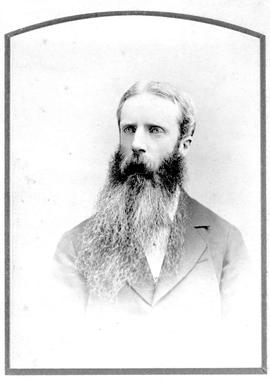
The winter, as he had feared, had turned out much harsher than most locals had predicted. Severe weather and heavy snows had hampered communication. The blocked roads in Washington Territory meant that “the greater part of our Canadian mial [sic]” was delayed.
When his family back in Ontario wrote wishing they could have seen Skippon and his party living in the BC Interior, he confessed:
if you had you would have seen a picture [as] I never shaved nor cut my hair[.] I lost my comb the first week we were out and . . . I never combed my hair for four months but we washed every morning and trimed our finger nails once in a while. when we came to Victoria I went to a barber and got my hair cut and champooned and got a new suit of cloths and next day I went to the office[.] my boss was there and I said good morning Mr. Carnby [Cambie] he said good morning sir and looked strainge for a moment and then burst into a laugh and said why George I declare I didn’t know you.[71]

His relations were also very much hoping Skippon would return home, but he vanquished their hopes by defending his new home and lifestyle:
The longer I stay here the better I like it the fact of it is I am more in my element here than I would be there in McGillivray[.] I would be nothing but an old bachlor alone and nobody like my self here … this is I believe the best place in the world. this community is made up of a lot of happy go lucky devil may care fellows who never think about tomorrow nor the next day but have a good time of it as long as it last.[72]
While Skippon transcribed a letter sent from Fort Wrangel to a friend in Victoria describing the life of a Cassiar miner, he confessed that, “I don’t call this a letter.” He sent it merely as a way of enlightening his relations about life in the north.[73]
The proliferation of exclusively male households was a common feature in Victoria and its environs. During the winter of 1874-75 Skippon was member of one such household. In early March 1875, he wrote a frank letter home in which he defended his lax domestic habits:
I tell you we have had great times in our old cabin home[.] my chum is an engineer [and] he has been in Egypt and India and he can spin a good yarn and he can play the flute he is a very steady fellow and I suppose just about the nicest man in the world. we as a rule go to be about twelve o’clock and get up when we take a notion. so I don’t see as how I could be much better off than I am. this have been the pleasantest winter I ever put in in my life but of course you know a man don’t get rich on it. but I don’t care much for riches so you see it suit me very well.[74]
However comfortable this living arrangement was, Skippon made it clear it was to be temporary:
but there is an end to every thing and the end has come to this sort of thing. I leave tomorrow on the steamer Maude for Nanaimo [as] I am going on survey again but not so far away this time . . . . you see by the papers they are going to build a rail road between Nanaimo and Esquimalt and this is the survey I am going on . . . I go with Mr. Hunter [and] we start at Nanaimo and [John] Trutch with another party start in Esquimalt and we meet in the centre so you see it will not be a long job but we expect them to keep us all summer in work….
He brought his letter to a close by enclosing a coin from China, of which, he stated, “I don’t know the exact value.” And he continued: “I must hurry up my cakes. by the by I am quite a cook now [though] yesterday I made a mess of soup well I though[t] it was good and my chum said it was splendid and he is a man that can believe so I know it was….”[75]
The next project upon which Skippon embarked was part of the ever-contentious battle over the mainland route of the as-yet elusive Canadian Pacific Railway. This found him back on the mainland for the summer of 1875.
In his next surviving letter, penned on 4 July, he noted that he had not written since he left Victoria on May 21st, “so I’ll just send you one for the fun of the thing.” He made no reference to the work between Victoria and at Nanaimo, but he noted that, after leaving Victoria, he and the surveying crew arrived at Soda Creek on the Fraser River on 5 June, having come some 600 miles, and having traversed the Chilcotin Plateau (“prairies”) which he called “the prettiest country to look at I ever saw.”
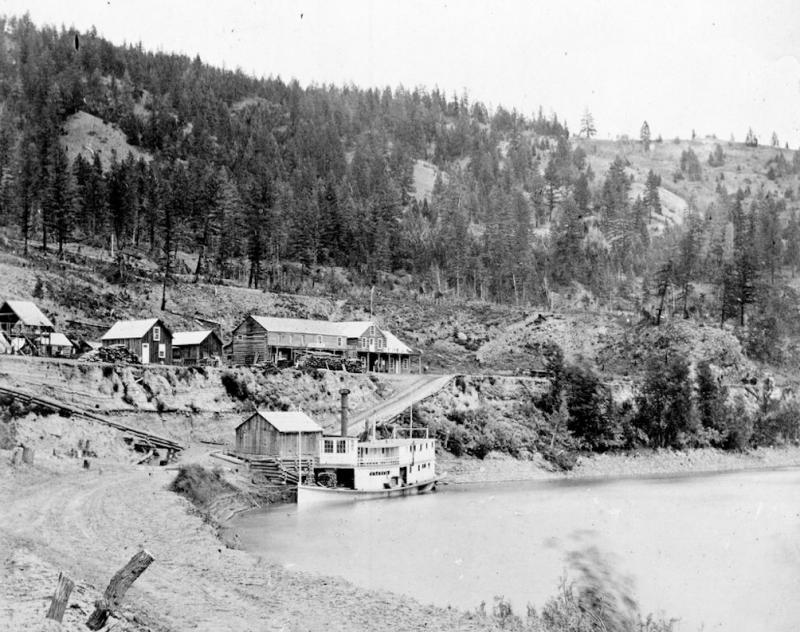
Located at an elevation of some 3,500 feet, the plateau contained much timber which, however, was “worthless and the land the same.” Despite this, the scenery was worth a comment “if you take the trouble to climb a mountain.” The view of the Coast Mountains (which he called the Cascades) was impressive. He noted, with some hyperbole, that they extended all the way “through south America and to the north pole if not further,” and “the summits of which are covered with perpetual snow.”
And while he conceded that:
we are camped on the side of a very pretty little lake there are lots of them out here and lots of fish ducks and geese in them[.] this is a good place for game [and] we are a pretty strong party this year [with] thirty white men besides five indians and have some great times out here … but the misquitoes are fearful [and] we have to wear misquitoes bars over our faces and sometimes buckskin gloves[.] we had a great fit of fun the other night with an Irish man [as] he went round his tent and called out for us to go for he had a misquitoe as big as a black bird so we all went to see and pat was holding him down with a stick in good earnest and what was it but a draggon fly about as long as your finger and he realy thought it was a misquitoe…. I can’t stand it any longer I am writing on my knee and am almost blinded with misquitoes so I’ll bid you Klahowya….[76]
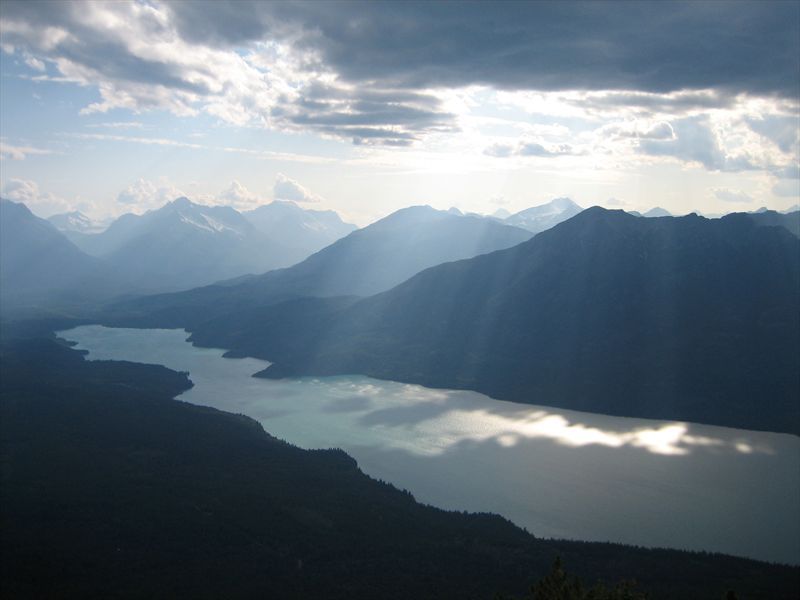
On 1 August, he received a letter written on July 17th relating the “sad news of my mothers death.” The letter reached him at Tatlayoko Lake, which Skippon rendered in his freestyle phonetic way as “Lake Tottabiaco.” “I would like for you to get a toombstone for her and my father,” he relied, and asked that the stone and all funeral expenses be paid using money drawn from his bank account. “I may come home in the fall I don’t know yet,” he added. He did not expect to be back to Victoria until November.[77]
In probably his last letter home, on 3 October 1875 Skippon, wrote from the Homathko River (which he referred to as Homathed River) in the Coast Mountains:
I have not wrote to you very lately but I had no chance [as] our mails have come to us pretty regular but we have not had a chance to send one out for a long time but our pack train are going to leave us now and they weill take this mail out[.] we are way in the mountains about two hundred miles from all civilization but we are well and in good spirits[.] This is a pretty wild looking old place . . . but I think if you were here for a day or two you would be quiet [sic] amused [by] the scenery [as it] is really magnificant [with] mountains of rock rising to the clouds . . . we saw one all snow and ice [and] there are three of them in here one of them is said to be the largest Glaizer [sic] in the world . . . we expect to get through about [middle] of November and be in Victoria about the latter end of Nov. and you better not write any more till you hear from me again [as] I may come home this fall I don’t know til I get back to Victoria and then I shall make up my mind pretty sudden and let you know….
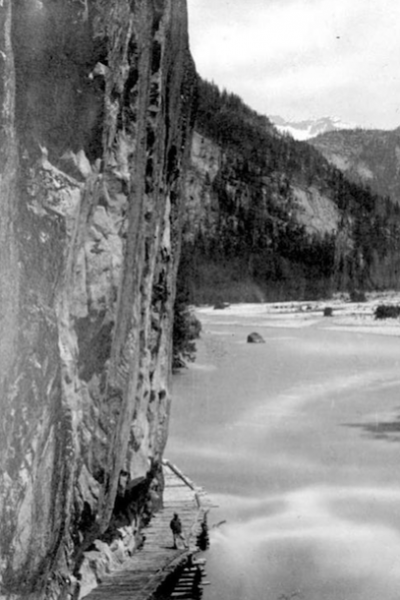
Having enclosed some more seeds he had collected, and given advice where they ought to be planted, he concluded, “Guess I will be home before the trees are very large . . . well I think thats all this time so good bye. George Skippon.”[78]
This was almost certainly the last communication his family would receive from him.
The evidence suggests that Skippon reached Victoria considerably earlier than he had anticipated – in October, not November, and that he gave up his vague plan to return to Ontario for travels even further afield.
He never did live to see the building of the CPR, which, on its completion a dozen years later, would have provided a direct link to his family.
On 3 December 1875, Skippon’s brother-in-law, John Donaldson, went to the post office at Ailsa Craig and found a letter from Henry Cambie waiting for him. Cambie made note of the well-publicized loss of the steamship Pacific on 4 November 1875. He wrote:
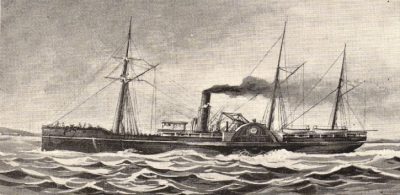
It is now my painful duty to inform you that Mr. George Skippon was on board the ill fated vessel and that there is not the faintest hope of his having escaped — only two men were saved out of three hundred who sailed that morning. I said goodbye to him just as the steamer left the wharf, and he then informed me that he intended to sail for New Zealand by first steamer from Sanfarancisco [sic], and hoped to reach there about Commencement of Harvest — which would be latter part of January.[79]

The loss of some 300 lives on the Pacific plunged Victoria into mourning.[80] Amongst the lost were several wealthy Victorians and Sewell Prescott Moody, who had built up a fortune through lumbering on the Burrard Inlet, and some fifty Chinese labourers booked in steerage.
As the Daily Colonist noted “We have no heart to-day to dwell on the disaster that has hurried into eternity so many of our fellow citizens with whom, only a few brief hours ago, we mingled on the streets or met in the social circle as full of life, hope and energy as any who may read The Colonist to-day.”[81]
For Skippon’s family back in Ontario the grief at the loss of a loved one was compounded by confusion and legal difficulties. In his last known letter, Skippon had indicated that he had, at least tentatively, intended on returning to Ontario. If Cambie was correct, and his footloose protégé had planned to venture to New Zealand, his family had received no word of it. Any letter he might have penned to this effect might have been lost in the mailbag on the same ship. Certainly these decisions made on a whim were in keeping with his character.
The family, however, was desperate for news of his last days, and also for proof that he had died in order to probate his will and settle his estate. Corroboration was difficult to find, but finally on 23 August 1876, Julius F.C. Englehart of Victoria, an agent for the San Francisco-based owners of the Pacific, made a sworn affidavit attesting to the fact that the ship had collided with another vessel off Cape Flattery and sank with a huge loss of life.
 Englehart also consulted the company’s record of those passengers booked upon the fateful voyage and found record of George Skippon having booked passage with ticket No. 43 on 3 November 1875, which entitled him to accommodation in the first berth in State Room 16. When news of the calamity had reached authorities in Washington Territory and Victoria, various vessels raced to the scene in an attempt to find survivors, but as was well-known, only two men were found alive.[82]
Englehart also consulted the company’s record of those passengers booked upon the fateful voyage and found record of George Skippon having booked passage with ticket No. 43 on 3 November 1875, which entitled him to accommodation in the first berth in State Room 16. When news of the calamity had reached authorities in Washington Territory and Victoria, various vessels raced to the scene in an attempt to find survivors, but as was well-known, only two men were found alive.[82]
As it turned out, one of the two survivors of the wreck was Henry Frederick Jelly, a twenty-two year-old from nearby Southwold Township in Elgin County, Ontario. In a sworn affidavit Jelly detailed the loss of the ship and his perilous story of survival.
In reference to five fellow passengers who had worked for the Canadian Pacific Railway, including Skippon, he admitted he knew of them and that while he had not worked directly with them, they “had one time camped close to each other.”
Jelly had a chance to speak with the five on board though he confessed he did not learn their names. However, upon being shown a photograph of Skippon, Jelly recognized the man in the likeness with one of those he had talked to aboard the ship. He noted that Skippon “told me that he was going to New Zealand with one other person … and he told me he was from the Province of Ontario.” While he had seen Skippon after supper on the fateful Thursday, he could not recollect seeing him afterwards and supposed that he had “lost his life” when the ship foundered.
 Jelly also recalled the chain of events that led to the drowning of 300 souls. Having passed Cape Flattery, Jelly retired to his cabin. About an hour later, he wrote, “I was awakened by a crash, and heard a great commotion among the passengers.” He immediately dressed and went on deck and saw the ship with which the Pacific had collided “at some distance.” And he continued:
Jelly also recalled the chain of events that led to the drowning of 300 souls. Having passed Cape Flattery, Jelly retired to his cabin. About an hour later, he wrote, “I was awakened by a crash, and heard a great commotion among the passengers.” He immediately dressed and went on deck and saw the ship with which the Pacific had collided “at some distance.” And he continued:
Very shortly afterwards it became apparent that the steamship Pacific must have sustained very severe injuries from the collision and the water came rushing into the steamship and it was seen the said steamship was fast sinking and then efforts were made to get the boats of the vessel launched. I got with others into one of the boats, but it capsized and I with the other persons in it was cast into the water, and I got with some other persons on the boat which floated bottom upwards and shortly afterward I saw the pilot house of the steamship a short distance off with only one person on it, and I managed to reach this.
Jelly remained on the precarious pilothouse “until about two o’clock on the following Saturday morning, when I was picked up by a passing vessel called the Messenger of Boston….” And he added, “I saw the said steamship Pacific sink about nine o’clock in the evening of Thursday aforementioned….” Being very close on the overturned boat, he “could see great numbers of persons floating and clinging to spars and other portions of the wreck.”
Jelly knew of only one other survivor, Neil O’Henley, who had been quartermaster aboard the Pacific. He did not know if any boats were successfully launched from the stricken vessel, but because “the sea became so rough, that in a few hours after the sinking . . . I believe it to be utterly impossible that any boat could have lived in it.”[83]
Subsequent records would confirm Skippon’s presence and loss aboard the doomed vessel.[84]
While the loss of the Pacific left a lasting scar on Victoria and its people, in Ailsa Craig, Ontario, Skippon’s disappearance haunted his family and left an indelible sense of loss. His letters home remained the last direct connection his sister Emily had with him.
Emily added his name to the marker commemorating his parents’ graves at St. George’s Anglican Church in Ailsa Craig, London Township. The headstone inscription reads:
GEORGE son of the above
Who lost his life by the wreck of the Steamer Pacific.
Nov. 4, 1875 AE 43 YRS
Why should we start and fear to die?
What timorous worms we mortals are!
Death is the gate of endless joy.
And yet we dread to enter there.
The author of these lines is Isaac Watts (1674-1748), the “Father of English Hymnody” and author of the Christmas carol, “Joy to the World.”
In 2016, friends and family members cut back the grass on the stone to reveal these words.
Long after her death, Emily’s children, grandchildren, and great-grandchildren preserved the letters as a memorial to a man best remembered as “an adventurer” who had struck out to see something of the world. His mercurial habits and apparently precipitous decision in November 1875 would see that he would never return to his farm. His letters were a testament to his having lived, to his hopes, dreams, failings, and perhaps more than anything else, to the affection with which he was held and remembered in his family.
The letters also provide interesting insights into the life of one who chose to sojourn in British Columbia and involve himself in this young and dynamic society coming to terms with the realities of Canada and the social and political realities that entailed.
George Skippon’s letters provide a rare insight into the tramps and peregrinations of a nineteenth-century farmer in a region he deemed “the prettiest country to look at I ever saw.”[85]
Acknowledgement: I am grateful to Ann and Murray McLean of Parkhill, Ontario, who preserved George Skippon’s letters and gave me access to them; and to Glenn Stott, Heather Robson, and Brad Polley for helping with the Skippon stone.
*
Greg Stott is an Associate Professor in the Faculty of Arts, Business, and Science at University College of the North (UCN) out of Thompson, Manitoba. He completed his PhD in Canadian History at McMaster University in 2004 having earlier earned his BA and MA in History at the University of Western Ontario. Before arriving at UCN in 2010, he taught at various institutions including a year at UBC Okanagan in Kelowna. Having grown up in the small rural community of Arkona, Ontario, his research interests include rural or suburban community histories. He has a weakness for private collections of hitherto unused letters and documents preserved by families and small community organizations.
*
The British Columbia Review
Publisher and Editor: Richard Mackie
Formerly The Ormsby Review, The British Columbia Review is an on-line journal service for BC writers and readers. The Advisory Board consists of Jean Barman, Wade Davis, Robin Fisher, Barry Gough, Hugh Johnston, Kathy Mezei, Patricia Roy, Maria Tippett, and Graeme Wynn. Provincial Government Patron (since September 2018): Creative BC. Honorary Patron: Yosef Wosk. Scholarly Patron: SFU Graduate Liberal Studies.
“Only connect.” – E.M. Forster
*
1 Skippon, Omaha, Nebraska, to John Donaldson Jr., Ailsa Craig, Ontario, 4 April 1873.
[2] www.ancestry.ca (Retrieved 5 February 2014).
3 Papers courtesy of Ann McLean.
[4] Skippon, Victoria, 28 January 1875.
[5] Skippon, Victoria, 28 January 1875. Skippon was not alone in seeking adventure or escape in British Columbia. A decade earlier, George Fawcett Drabble (1833-1901) made a hasty and precipitous decision to leave his life, including a wife and children, in England for the comparative unknowns of the Pacific coast. Richard Somerset Mackie, The Wilderness Profound: Victorian Life on the Gulf of Georgia (Victoria: Sono Nis Press, 1995), xi, 15–17, 22, 37-45.
[6] Last Will and Testament of George Skippon, signed 22 March 1873. He made smaller provisions for his sister Susannah Humble and her daughter, as well as for his brothers Thomas and William and his other sister, Elizabeth. He named his two brothers-in-law as his executors. Skippon kept tabs on affairs relating to his holdings in Ontario. “Well you can insure if you like for about $800 the house for 6 and the barn for $200 if you do take the cash system I think I have got all the letters you sent but I have got none from Humbles I wrote them 3 or 4 and wrote one to F. Rosser.” Skippon, North Saanich, 24 August 1873. “I went to Victoria last Monday,” he noted two months later, “and I got two letters from you and two from Humble these are the first I have got from him . . .” Skippon, North Saanich, 26 October 1873. See Adele Perry, “Hardy Backwoodsmen, Wholesome Women, and Steady Families: Immigration and the Construction of a White Society in Colonial British Columbia, 1849-1871,” Histoire sociale/Social History 33: 66 (2000), 343-350.
[7] Kathleen A. DeHaan, “Negotiating the Transnational Moment: Immigrant Letters as Performance of A Diasporic Identity,” National Identities 12 (June 2010), 107-131; Elsbeth Heaman, “‘The Whites are Wild About It’: Taxation and Racialization in Mid-Victorian British Columbia,” Journal of Political History 25 (3 2013): 354-284.
[8] Robert Hogg. Men and Manliness on the Frontier: Queensland and British Columbia in the Mid-Nineteenth Century (London: Palgrave Macmillan, 2012), 1-4, 9-22.
[9] Skippon, San Francisco, to the Donaldsons, Ailsa Craig, 16 April 1873.
[10] “I suppose you will be looking for a letter from me if you got my letter from Omaha you will think by the rate I was going then I am in Victoria by this time but we went slower from Omaha eight miles an hour is all they are allowed to run and wait for trains to pass to as it is a single track….” Skippon, San Francisco, to the Donaldsons, Ailsa Craig, 16 April 1873.
[11] Skippon, 16 and 26 April 1873.
[12] Ibid.
[13] Ibid.
[14] Ibid
[15] Skippon, Victoria, 28 April 1873.
[16] “They Come,” Daily British Colonist, April 27, 1873. It is impossible to know the identities of the women and men Skippon encountered. It seems likely that he refers to a marginalized population of Aboriginal women. See Penelope Edmonds, Urbanizing Frontiers: Indigenous Peoples and Settlers in Nineteenth Century Pacific Rim Cities (Vancouver: UBC Press, 2010), 5-9, 218-222. See also Jean Barman, “Aboriginal Women on the Streets of Victoria: Rethinking Transgressive Sexuality During the Colonial Encounter,” in Katie Pickles and Myra Rutherdale, eds., Contact Zones: Aboriginal and Settler Women in Canada’s Colonial Past (Vancouver: UBC Press, 2005), 205-227.
[17] Skippon, Victoria, 28 April 1873.
[18] Ibid.
[19] Skippon, Victoria, May 19, 1873.
[20] Ibid.
[21] Ibid.
[22] Ibid. See also Robert A.J. McDonald. Making Vancouver, 1863-1913 (Vancouver: University of British Columbia Press, 1996), 4-9; Edmonds, 189-192, 195-199. The extinguishment of Aboriginal title left many of these dispossessed peoples living on reserves on the margins of the newly formed colonial cities like Victoria. See Cole Harris, “The Native Land Policies of Governor James Douglas,” BC Studies 174 (Summer 2012), 101-122.
[23] Skippon, 19 May 1873. Skippon was also pleased to report that “they have a very good band here [and] they play on the street two or three nights in the week.”
[24] Skippon, 19 May 1873. Skippon’s work ethic would have found him at odds with the ideals of colonial authorities, who attempted to impose and encourage notions of “hardy backwoodsmen,” and who envisioned conscientious workers as the backbone of an otherwise more pluralistic and diverse society. While Skippon would have met the desired criterion of British ethnicity, his lackadaisical attitude toward steady employment, his eschewing of matrimony and thus his failure to establish a nuclear family, would have found him wanting. Adele Perry, “Hardy Backwoodsmen, Wholesome Women, and Steady Families: Immigration and Construction of a White Society in Colonial British Columbia, 1849-1871,” Histoire sociale/Social History 33 (2000), 343-360.
[25] Skippon, Victoria, to Emily Donaldson, 28 June 1873. Daily British Colonist [Victoria], 4 June 1873, page 1. Charles Morton was the proprietor of the Angel Hotel on Langley Street and charged $6.00 per week.
[26] Skippon, Victoria, to Emily Donaldson, 28 June 1873. See also Robie L. Reid, “Why ‘Bits’?” British Columbia Historical Quarterly 4 (January 1940), 21-28.
[27] Skippon, Victoria, Emily Donaldson, 11 July 1873. Skippon later qualified his statement about the absence of flies noting that “I told you we had no flies here but I take that back [as] we have plenty we had none til August and they are beginning to leave now.” Skippon, North Saanich, 28 September 1873.
[28] Ibid.
[29] The classic account is Robert Galois and Cole Harris, “Recalibrating society: The Population Geography of British Columbia in 1881,” Canadian Geographer 38: 1 (1994), pp. 37-53.
[30] Ibid.
[31] Hogg, Men and Manliness, 85-120.
[32] Skippon, Victoria, 24 July 1873. Skippon then engaged in a bout of berry picking and promised to send his sister some seeds. He explained that a thimble-like berry was so plentiful that “in the upper country men have lived on it and nothing else for days….” That winter, Skippon explained that the good farmland tended to be hidden in out of the way pockets: “When you leave Victoria you strike a good gravel road you can follows this for miles and not see a house [as] it runs through pine woods in some places so thick you can’t see int[o] them a road[.] this land is considered no good but you will see trails as they call them cut through the woods [and should you] follow them for sometimes a mile and you come to a fine farm so you see the country don’t show off to advantage.” Skippon, North Saanich, 16 November 1973.
[33] See Richard Mackie, “The Colonization of Vancouver Island, 1849-1858,” BC Studies 96 (Winter 1992-93), 3-40.
[34] Skippon, Victoria, 28 July 1873, 10 a.m.
[35] Skippon, Victoria, 28 July 1873, 2 p.m.
[36] Ibid. Robert Brown (ca.1813-1893) was later described as “a B.C. pioneer” who accumulated “considerable property.” Robert and Ann (1812-1892), who later retired to Victoria, were survived by three children. Victoria Daily Colonist, 26 November 1893, pp. 5 and 8; Ibid., 18 August 1892, p. 8. Joan Butler Gilbert, Saanich Pioneer Society, email of 9 March 2014. First Victoria Directory, Third Issue, and British Columbia Guide (Victoria: E. Mallandaine, 1869), 20.
[37] Skippon, North Saanich, 17 August 1873.
[38] Skippon, North Saanich, 24 August 1873.
[39] Ibid.
[40] Ibid.
[41] Skippon, North Saanich, 24 August 1873.
[42] See George Lang, Making Wawa: The Genesis of Chinook Jargon (Vancouver: UBC Press, 2008).
[43] Skippon, Victoria, undated note, no date.
[44] Skippon, North Saanich, 28 September 1873. Skippon made contact with another Brown family in Victoria, who kept a hotel. Apparently they were not related to Skippon’s North Saanich employer, but Mrs. Brown was a sister of James Monaghan who was known to both Skippon and his Ontario relations.
[45] Skippon, North Saanich, 26 October 1873. See Willard E. Ireland, “Early Flour-mills in British Columbia,” British Columbia Historical Quarterly 5:2 (April 1941), 89-109. In 1868, Brown had, in fact, inaugurated the Saanich Fair in his own barn in 1868. See Victor E. Virgin, History of North and South Saanich Pioneers and District (Victoria: Hebden Printing, 1959), 51, and Betty Bell, The Fair Land: Saanich (Victoria: Sono Nis Press, 1982), 94.
[46] Skippon, North Saanich, 26 October 1873. The Saanich Fair was held on 2 October 1873, although “[t]he bridges on the cross roads leading to the ‘show grounds’ are in a fearfully dangerous state.” It was later explained that the fair “passed off pleasantly. The articles and animals shown were generally excellent and were greatly admired.” “From Saanich,” Daily British Colonist, 30 September 1873, p. 3; “The Saanich Show,” Daily British Colonist, 4 October 1873, p. 3. The “knobs” Skippon refers to were the large landowners of the “Family-Company-Compact.” See Mackie, “The Colonization of Vancouver Island,” 22-25, for the genesis of this local landed gentry.
[47] Skippon, North Saanich, 16 November 1873. “The Pacific Railway Slander,” Daily British Colonist, 22 July 1873, p. 3; “The Railway Covenant,” Daily British Colonist, 16 November 1873, p. 2.
[48] Skippon, North Saanich, 24 December 1873.
[49] Ibid.
[50] Ibid.
[51] Ibid.
[52] Skippon, North Saanich, 24 December 1873. Earlier, on 23 November 1873, Skippon commented on letters he had received from friends and relations or complained about those from whom he had had no word.
[53] Skippon, North Saanich, 10 January 1874. A native of Tiverton, England, John Dart Bryant (1835-1922) and his wife Betsy Turgoose (1837-1923) came to Saanich by way of San Francisco in 1865. Norma Sealey of the Saanich Pioneer Society, email of 15 June 2014. First Victoria Directory, Third Issue, and British Columbia Guide (Victoria: E. Mallandaine, 1871), 5.
[54] Skippon, 10 January 1874.
[55] Ibid.
[56] Skippon, North Saanich, 25 January 1874. Some enterprising Victoria residents who happened to own “a few nice cutters” rented them out at the astounding rate of five dollars per hour. This bonanza was short-lived, however, as the snow began to quickly melt. “Heavy Snowfall,” Daily British Colonist, 18 January 1874, p. 3.
[57] Ibid.
[58] Skippon, North Saanich, 22 February 1874.
[59] Skippon, North Saanich, 22 February 1874.
[60] Ibid.
[61] Skippon, North Saanich, 26 March 1874; “Return of the Steampship California Later from Stickeen,” Daily British Colonist, 4 December, 1873, p. 3. Victoria was soon incensed by charges that the government agent at Buck’s Bar was facilitating the dispossession of miners of legally filed claims. “Startling Outage at Cassiar,” Daily British Colonist, 5 December 1873, p. 3 and “The Government Outrage at Cassiar,” Daily British Colonist, 7 December 1873, p. 2. A report filed in early 1875 noted that, “From the 1st of January to the last of October, 1874, 1,624 miners, bound to Cassiar, landed at Fort Wrangle.” “New Nor’-Westers” The New North-West (Deer Lodge, Montana), 12 February 1875, p. 1.
[62] Skippon, North Saanich, 20 April 1874.
[63] Skippon, Victoria, 18 May 1874. On 28 January, 1875 Skippon wrote, “I was quite amused the other day I took up the Ottawa times and it said the Victoria colinist [sic] in speaking of the arrival of miners from Cassiar the new eldorado of British Columbia says they all have mony the results have been good and all agree a country more extensive and richer than Cariboo . . . now whoever pened that be he man or be he woman he is a liar sure. there is gold in Cassiar and some done very well but it is no comparison to Cariboo [so] you can’t believe half [of what] you see in the papers.” Skippon, Victoria, 28 January 1875.
[64] Skippon, Victoria, 15 June 1874; George Mercer Dawson, Douglas Cole, and Bradley John Lockner. The Journals of George M. Dawson: British Columbia, 1875‑1878, Vol 1 (Vancouver: UBC Press, 1989), 10-11.
[65] Pierre Berton, The National Dream: The Great Railway 1871-1881 (Toronto: McClelland and Stewart, 1972), 60-61, 148, 188, 194-195, 273-274.
[66] Skippon, Victoria, 6 July 1874.
[67] Skippon, Victoria, 29 November 1874.
[68] Skippon, Mahood Lake, September 6, 1874. As he was wont to do, he enclosed various seeds for this family back in Ontario to try growing, including seeds for the serviceberry. He felt “they will be hardy enough for Canada.”
[69] Skippon, Victoria, November 29, 1874. Victoria Daily Colonist, November 19, 1874.
[70] Skippon, Victoria, 20 December 1874.
[71] Skippon refers here to Henry J. Cambie (1836-1928) a surveyor attached to some of the earliest surveys for the CPR. Berton, National Dream, 152, 215-216.
[72] Skippon, Victoria, 28 January 1875.
[73] Skippon, Victoria, 8 February 1875.
[74] Skippon, Victoria, 9 March 1875. Hogg, Men and Manliness, 112-113.
[75] Skippon, Victoria, 9 March 1875. At the bottom he wrote “Buckhorn Lake Chilliten.” “The Island R.R. Survey — Mr. Hunter, C.E., with the following staff and men, will leave by steamer Maude for Nanaimo this morning” including an assistant named G. Skippon. Victoria Daily Colonist, 10 March 1875. See Julian Brooks, “Joseph Hunter: Forgotten Builder of British Columbia,” British Columbia Historical News 28:2 (Spring 1995), 27-31.
[76] Skippon, British Columbia, 4 July 1875.
[77] Transcript of “George Skippon, Lake Tottabiaco, Cluttiten County, BC, August 2, 1875.” Used as “Exhibit A” in documents filed on behalf of George Skippon’s estate by John Donaldson. It is likely that Skippon was in camp when George Dawson (1849-1901) came through the vicinity of Tatlayoko Lake in early September 1875. Dawson, Cole, and Lockner, The Journals of George M. Dawson, Vol 1, 78-79, 82-83.
[78] Skippon, Homathed River, Cascade Mountains, 3 October 1875.
[79] H.J. Cambie, Canadian Pacific Railway Survey Western Division, Victoria, 15 November 1875.
[80] See Derek Pethick, British Columbia Disasters (Langley: Stagecoach Publishing, 1978), 56-68. The sidewheeler SS Pacific had been built in 1851 and operated out of San Francisco. The vessel had been seriously damaged in the early 1860s but had been refurbished, and during the lean years from 1872 to 1875 the ship had been mothballed. News of the gold rush at Cassiar led to the ship being reinstated to the San Francisco to Victoria run. While it was estimated that there were 275 aboard, inexact records made a definite count difficult. See also Dawson, Cole, and Lockner, The Journals of George M. Dawson, Vol 1, 105, 107, 110-111, 183
[81] “The Great Calamity” Daily British Colonist, 9 November 1875, 2. Pethick, British Columbia Disasters, 59. Hostility toward Chinese workers in British Columbia is well documented. See, for example, Heaman, “‘The Whites are Wild about It,’” 355-356.
[82] Julius F.C. Englehart, sworn affidavit dated 23 August 1876, Victoria. Pethick, British Columbia Disasters, 62-68. Inquiries ultimately found that the collision was the fault of the sailing vessel Orpheus and its incompetent captain. However, it was also concluded that the Pacific was in an appalling state due to shoddy inspections and poor maintenance and that the evacuation of the ship was hampered by similar incompetence and confusion. It was estimated that some twenty passengers and crew survived the sinking but most of them succumbed to exposure before they could be rescued.
[83] Henry Frederick Jelly, sworn affidavit dated December 1875.
[84] Edgar Wilson Wright, Lewis & Dryden’s Marine History of the Pacific Northwest (Portland, Oregon: Lewis & Dryden Printing Co., 1895), 224.
[85] Skippon, British Columbia, 4 July 1875.
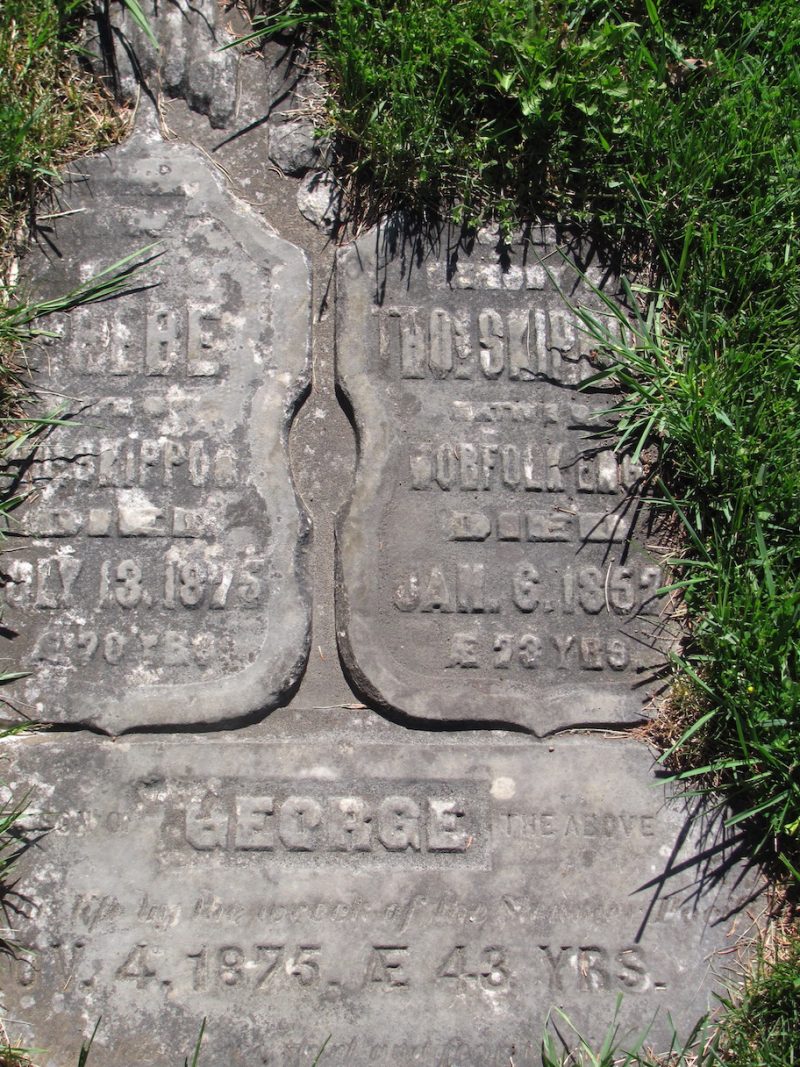

2 comments on “#123 Out of this world: George Skippon in BC, 1873-1875”
The Lord’s Prayer in Chinuk Wawa written down by Skippon is copied from George Gibbs’ influential 1863 dictionary, possibly from some later plagiarism thereof, as a number of publications cribbed it from Gibbs. For quite a number of Chinook Lord’s Prayers — it was really a popular text to translate into the “Jargon” — you can do some reading at my website, ChinookJargon.com.
Thanks for an excellent and absorbing read!
David Douglas Robertson PhD
Comments are closed.